

Global disease burden expected to increase over next 20 years as populations age. What Can We Learn From Swimmers of a Certain Age? A doctor and medical ethicist argues life after 75 is not worth living. In October 2014, Ezekiel Emanuel published an essay in the Atlantic called “Why I Hope to Die at 75.”

Because Emanuel is a medical doctor and chair of the University of Pennsylvania’s department of medical ethics and health policy, as well as a chief architect of Obamacare, the article stirred enormous controversy. How to Deal with the End of a Life – Better Humans. Dear X, I’m sorry about your dad.
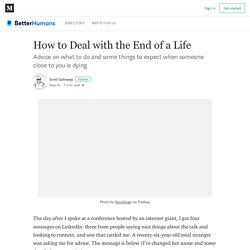
First, some fine print. I have no real credentials nor empirical data around providing comfort to sick parents. These are very personal decisions. What I can tell you is what I did when my mom was sick and what I learned. The Joy of Being a Woman in Her 70s. Wake Up In The Middle Of The Night? 15 Reasons You Can't Stay Asleep. A New Test Predicts When You’ll Die (Give or Take a Few Years) How to Die Well, According to a Palliative Care Doctor.
Places I Want To See Before I Die - Accueil. Economist. What’s the prime of your life? Do you ever worry that the prime of your life has already passed you by – and it didn’t even have the courtesy to let you know as it flew overhead?

They say that life begins at 40, or that 60 is the new 50 – but what’s the truth? What’s the best age to be? To find out, BBC Future scoured the medical literature, examining how everything from your memory to your sex drive changes across the lifetime. And we were pleasantly surprised by what we found. Consider physical fitness. For activities that require short and sudden bursts of energy – like the 100m sprint, shot-put, or javelin – the starting pistol should have fired by your mid-20s, since there is a rapid decline thereafter. Some sports suit older athletes better Yet older athletes perform much better in gruelling “ultra-endurance” events, such as 100km, or 1000km, marathons.
At first glance, the mind’s fate is less cheering. Past your 20s, your ability to commit new facts to memory has already seen better days. American Nurse Today. Physical symptoms in the last 2 to 3 months of life. Here’s a list of some of the things a person goes through as death gets closer.
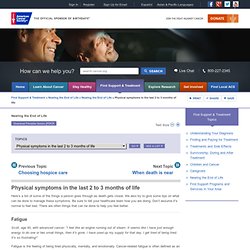
We also try to give some tips on what can be done to manage these symptoms. Be sure to tell your healthcare team how you are doing. Don’t assume it’s normal to feel bad. There are often things that can be done to help you feel better. Fatigue Scott, age 60, with advanced cancer: “I feel like an engine running out of steam. Signs of Approaching Death (End of Life) By William Lamers, M.D. former Medical Consultant, Hospice Foundation of America Note: This is a general picture.
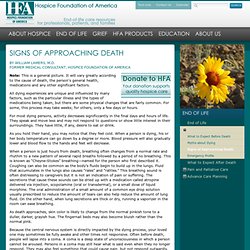
It will vary greatly according to the cause of death, the person's general health, medications and any other significant factors. All dying experiences are unique and influenced by many factors, such as the particular illness and the types of medications being taken, but there are some physical changes that are fairly common. For some, this process may take weeks; for others, only a few days or hours.
For most dying persons, activity decreases significcantly in the final days and hours of life. As you hold their hand, you may notice that they feel cold. When a person is just hours from death, breathing often changes from a normal rate and rhythm to a new pattern of several rapid breaths followed by a period of no breathing. Late Stage and End-of-life Care: Caregiving in the Final Stages of Life. Understanding late-stage care In the final stages of life-limiting illness, it can become evident that in spite of the best care, attention, and treatment, your loved one is approaching the end of his or her life.
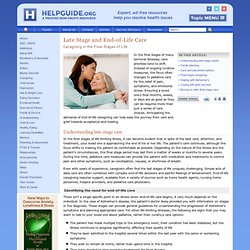
The patient's care continues, although the focus shifts to making the patient as comfortable as possible. Depending on the nature of the illness and the patient’s circumstances, this final stage period may last from a matter of weeks or months to several years. During this time, palliative care measures can provide the patient with medication and treatments to control pain and other symptoms, such as constipation, nausea, or shortness of breath.
The Dying Process - Signs the Dying Process has Begun. Updated December 20, 2014.
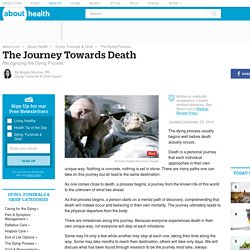
The dying process usually begins well before death actually occurs. Death is a personal journey that each individual approaches in their own unique way. Nothing is concrete, nothing is set in stone. The Dying Process - Signs the Dying Process has Begun. What Good Is Thinking About Death? In the heart of every parent lives the tightly coiled nightmare that his child will die.

It might spring at logical times—when a toddler runs into the street, say—or it might sneak up in quieter moments. Www.bbc.